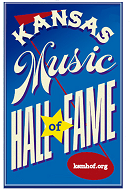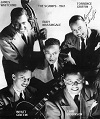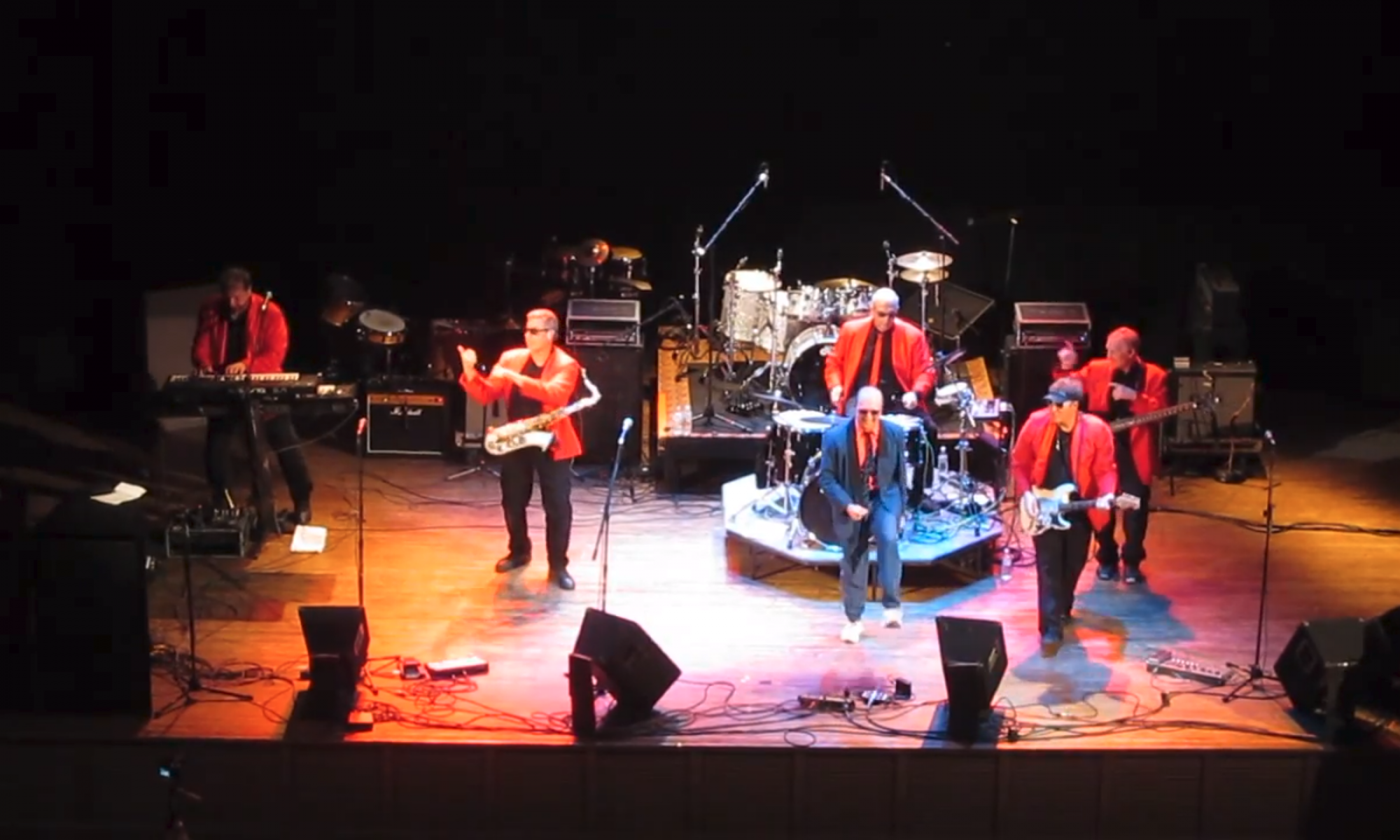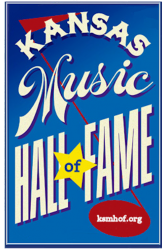 |
|
||||||||||||||||||||||||||||||||||
 |
Kansas City singer/songwriter, Angela Hagenbach, has been hailed as “one of America’s best fresh voices in jazz,” and a staple in the Kansas City scene for nearly three decades, singing everything from swinging straight-ahead jazz standards, blues and original compositions, to sensual rhythmic Latin jazz. A former trombonist and fashion model (at different times), her professional music career was launched in 1990. Angela’s national debut recording, ‘Weaver Of Dreams,’ released in January 2001, was nominated for a Grammy, and shot to the number five position on the Gavin Jazz Chart in six short weeks. Angela’s talents have placed her on the international stage, from The Kennedy Center for the Performing Arts, to opening for Ray Charles in Marciac, France. She was twice chosen to represent the United States as a Jazz Ambassador to the world under the auspices of the United States Information Agency and the Kennedy Center for the Performing Arts. |
||||||||||||||||||||||||||||||||||

|
A jazz vocalist, songwriter and pianist, Karrin Allyson began her career in music while attending the University of Nebraska Omaha on a classical piano scolarship. During her college years she became lead singer for an all-female rock band called Tomboy, while also developing an avid interest in jazz. She eventually moved to Kansas City where her career as a jazz artist began to take off in earnest, both locally and nationally. Signed to Concord Records, she recorded twelve albums for the label, recording eight of them in Kansas City, and earning Grammy nominations for five in all. Her first all-original album, “Some of That Sunshine,” was released in August of 2018 to rave reviews, with Jazz Times writing that “Allyson unleashes her equally impressive dexterity as a songwriter.” Allyson’s trademark jazz style is influenced by a diverse variety of musical genres including Blues, Latin, Pop, Rock, Ballads, Jazz Standards, and other Jazz modalities. Besides English, Allyson also sings in French, Portugese, Spanish and Italian, which adds to her appeal as an international artist. |
||||||||||||||||||||||||||||||||||
 |
Ric Averill is the Emeritus Artistic Director of Performing Arts at the Lawrence Arts Center. Averill is a director, playwright, screenwriter, musician, composer, conductor, actor and educator. Ric’s largest musical work is a drama/ballet based on The Snow Queen by H.C. Andersen, which opened in 2006 at the Lawrence Arts Center featuring a 12 piece orchestra. Averill also composed a youth opera based on The Emperor’s New Clothes for the John F. Kennedy Center for the Performing Arts in Washington, DC. The body of Ric’s Youth Theater work may be found at Dramatic Publishing, and includes musicals and plays with music. Ric’s Seem-To-Be Songbook features children’s song heard across Kansas such as Ghostly Hall and The Pirate Song. Ric’s opera with modern dance, rock instrumentation and digital scenery, Midnight Visit to the Grave of Poe; A Grotesque Arabesque, premiered at the Lawrence Arts Center in October of 2015. The success of this work resulted in Ric receiving a commission from the Rebel Playhouse to write a new musical, The Fantastical Dangerous Journey of Q, funded in part through an Aurand Harris Grant from the Children’s Theatre Foundation of America. Q premiered in New York at the 14th Street Y on December 1st, 2018. In addition to composing children’s songs, operas and ballets, Ric is often found as a professional performer and/or music director. Ric’s primary instrument is the piano, but he also plays the mandolin, banjo, fiddle, guitar, bass or pretty much anything with strings. Ric loves jamming with friends, and looks for opportunities to hire fellow musicians for work in theatre as often as possible. |
||||||||||||||||||||||||||||||||||
 |
Rick Faris was born into a musical family. Rick’s father was a touring musician who played with legends such as Reba McIntyre, and on TV shows like Hee Haw, Nashville Now, and The Grand Old Opry. While still in grade school, Rick and his four brothers, plus mom and dad, formed the award-winning Faris Family Bluegrass Band. They played festivals, taught Bluegrass in school programs, and shared real connections for the twelve years they toured professionally. After the family decided to stop touring, Rick was looking for a new full-time gig. He got his first big break when Bluegrass stalwart Greg Cahill called and asked him to audition for his group, Special Consensus. Winning the job was a challenge, because Greg asked him to play mandolin rather than the guitar he’d been playing since childhood. With five weeks to learn the instrument, Rick stepped up and won the audition. After six years, a Grammy nomination, and two IBMA Awards, he switched back home to guitar as the band picked up another three IBMA Awards and a second Grammy nomination. Rick spent a total of eleven years with the globetrotting Special Consensus. Under Greg Cahill, he learned the meaning of professionalism and giving back to the Bluegrass community. |
||||||||||||||||||||||||||||||||||
 |
The origins of The Scamps go back to the late ’30s and a Civilian Conservation Camp in Parsons, Kansas. While there, workers Earl Robinson from Kansas City, Kansas and James Whitcomb from Baxter Springs, Kansas along with two others, would entertain to pass the time. Someone nicknamed them “The Scamps of CC Camp,” and the nickname stuck. Robertson and Whitcomb eventually re-located to Kansas City where they added brothers Wyatt and Torrence Griffin, plus Rudy Massingale, to the group (all three KC residents). World War II put a temporary halt to The Scamps, with most of the group enlisting in the armed forces. With the war over by 1946, Earl Robinson and friends were back in Kansas City, eager to pick up where they left off. The first official lineup of The Scamps was: Earl Robinson (lead vocals and drums), James Whitcomb (stand-up bass and vocals), Torrence Griffin (vocals), Wyatt Griffin (guitar and vocals), and Rudy Massingale (piano, sax, and vocals). Their first professional appearance was in 1946 at the Sherman Bar, 9th and Locust, Kansas City, Missouri. With their reputation as a live act spreading quickly, Modern Records in Los Angeles heard them and offered a recording contract. The Scamps first record release in January of 1947 was “Don’t Cry Baby,” backed with “More Than You Know.” Drummer Earl Robinson sang lead vocals on this, and all of their Modern releases. The Scamps also recorded for Okeh, Peacock, and Columbia Records, with some releases listing them as “The Five Scamps.” After years of touring and recording, by the mid-1950’s the Earl Robinson-led Scamps had settled back home in Kansas City once again, becoming a fixture in the city’s nightlife, holding court in every prominent jazz club and concert setting the city had to offer. Even with numerous personnel changes, the Scamps had been a Kansas City favorite for over half a century by May of 2002, when city officials renamed a section of 8th Street spanning from Broadway to Central as “Scamps Alley” in their honor. Original members Earl Robinson and Rudy Massingale were both present at the ceremony. That same year, British reissue label Ace Records released Red Hot!, a 22-track collection of the group’s vintage recordings. |
||||||||||||||||||||||||||||||||||
 |
Son Venezuela has been a Latin music ambassador in America’s heartland for over 30 years, and has been an important force in the development of the Latin Community in Kansas. Since 1994, the Lawrence-based band has continuously brought Latin culture, through music and dance, to clubs, festivals, concert halls, and private events in Kansas, all over the Midwest, and beyond. Kansas City’s entertainment journal The Pitch Weekly called Son Venezuela “The premier Latin grove ensemble in the area,” and their readers agree. Son Venezuela has been voted best Latin/World music act six times. During their tenure over several time-spans, they’ve been one of the biggest drawing bands of any type of music in Lawrence and Kansas City. |
||||||||||||||||||||||||||||||||||
 |
The Cotillion Ballroom is a concert venue in Wichita, Kansas. By the late 1950s, Wichita needed a quality place to go for all kinds of entertainment functions, especially concerts. A precursor of the Cotillion Ballroom, The Moonlite Gardens, had hosted rocker Eddie Cochran’s last live US performance in November of 1959, because The Cotillion was still under construction. Finally finished in 1960, The Cotillion proved to be a 28,500-square-foot building boasting a circular design, with large wooden beams supporting a 24-foot high domed ceiling over an 11,000-square-foot floating hardwood dance floor, and a stage that features a neon lit band shell. With a maximum concert capacity of 2,000 people, The Cotillion soon began its run of historic shows. Some notable ones during the ’60s include an appearance by the Yardbirds on August 15th, 1966 that marked the final performance of guitarist Jeff Beck with the group. Fats Domino performed there in 1968, as did Janis Joplin with her Kozmic Blues Band on October 24th, 1969. |
||||||||||||||||||||||||||||||||||
 |
The Cotillion Ballroom is a concert venue in Wichita, Kansas. By the late 1950s, Wichita needed a quality place to go for all kinds of entertainment functions, especially concerts. A precursor of the Cotillion Ballroom, The Moonlite Gardens, had hosted rocker Eddie Cochran’s last live US performance in November of 1959, because The Cotillion was still under construction. Finally finished in 1960, The Cotillion proved to be a 28,500-square-foot building boasting a circular design, with large wooden beams supporting a 24-foot high domed ceiling over an 11,000-square-foot floating hardwood dance floor, and a stage that features a neon lit band shell. With a maximum concert capacity of 2,000 people, The Cotillion soon began its run of historic shows. Some notable ones during the ’60s include an appearance by the Yardbirds on August 15th, 1966 that marked the final performance of guitarist Jeff Beck with the group. Fats Domino performed there in 1968, as did Janis Joplin with her Kozmic Blues Band on October 24th, 1969. |
||||||||||||||||||||||||||||||||||
 |
Philip Frederick Anschutz, born December 28, 1939 in Russell, Kansas, is an American billionaire businessman who owns or controls companies in a variety of industries, including energy, railroads, real estate, sports, newspapers, movies, theaters, arenas and music. In 2004 he purchased the parent company of the Journal Newspapers, which under Anschutz’s direction became the Washington Examiner. Anschutz is the son of Fred and Marian Pfister Anschutz. His first cousin is fellow Russell native and longtime news anchor Wendall Anschutz. |
||||||||||||||||||||||||||||||||||

